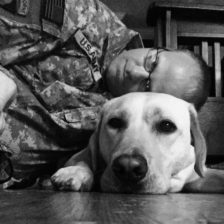Apparently, Tuesday was World Poetry Day 2017.
Somehow I missed that.
In honor of that day, let me share a few poems with you. These poems are not my own, but they are some of the works of Marguerite Guzman Bouvard, Brian Turner, and Jehanne Dubrow (who has a sixth book of poetry that will be published by Southern Illinois University Press).
Bouvard is the author of award winning books of poetry and also the book The Invisible Wounds of War: Coming Home from Iraq and Afghanistan.
Here’s What Words Can Do (for James Wright)
As he scans the list
of battle-frayed soldiers,
the officer shrugs.
Their night sweats,
their inner numbness
are a foreign language to him.
Can no longer be deployed
is what he doesn’t say.
But in a small town up North
a college president walks out
of his kingdom of books
and humming classes,
across neatly mowed lawns
and into hospital wards
where days keep collapsing
in the corridors. A former marine,
he comes with his own
memories, speaking the language
of tremors, nightmares
and invisible wounds.
He moves from one
bed to another,
holding each patient
with his words. He turns these
words into ladders
the maimed can climb up
and out into the world again.
Brian Tuner is a poet, essayist, professor, and veteran. He has read selected poems at the Carbondale (IL) Public Library. Here’s his poem JUNDEE AMERIKI
At the VA hospital in Long Beach, California,
Dr. Shushruta scores open a thin layer of skin
to reveal an object raveling up through muscle.
It is a kind of weeping the body does, expelling
foreign material, sometimes years after injury.
Dr. Shushruta lifts slivers of shrapnel, bits
of coarse gravel, road debris, diamond
points of glass–the minutiae of the story
reconstructing a cold afternoon in Baghdad,
November of 2005. The body offers aged cloth
from an abaya dyed in blood, shards of bone.
And if he were to listen intently, he might hear
the roughened larynx of this woman calling up
through the long corridors of flesh, saying
Allah al Akbar, before releasing
her body’s weapon, her dark and lasting gift
for this jundee Ameriki, who carries fragments
of the war inscribed in scar tissue,
a deep intractable pain, the dull grief of it
the body must learn to absorb.
The last poem that I will share with you all is by Jehanne Dubrow. Dubrow is a poet, essayist, editor and teacher. Here is her poem, Shabbat Prayer, On the Occasion of War (beginning with a line from Siegfried Sasson)
A flare went up; the shining whiteness spread,
as though it were a match bright enough
to light the room, but not so bright it snuffed
the residue of darkness overhead.
There once was darkness signifying calm—
our candles glowed
beside the window, the nights did not explode,
or bullets ricochet, or firebombs
turn streets to ash. We drank a glass of wine.
The night served as the complement to the day,
like salt or something sweet. And in this way,
we tasted syrup mixed with brine.
And, in this way, we learned a prayer
that joined the shadow with the shining flare.
Normally when I share poetry with my students I give them a chance to read through the poem and then respond. No worries, you all won’t have to do that. But, these poems are part of the book by Bouvard. Regardless of World Poetry Day or not, there are poets out there writing some remarkable pieces that are worth reading.
